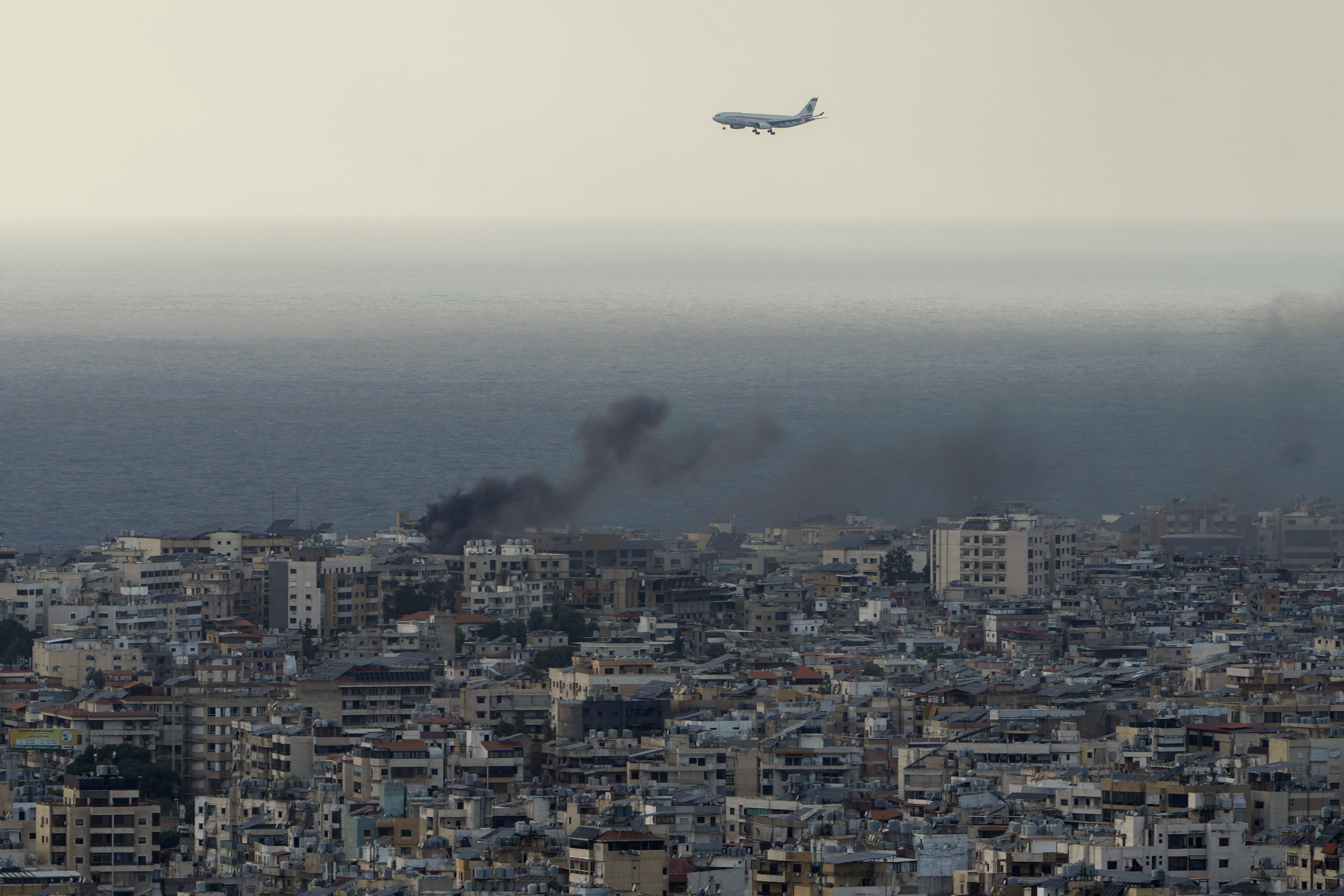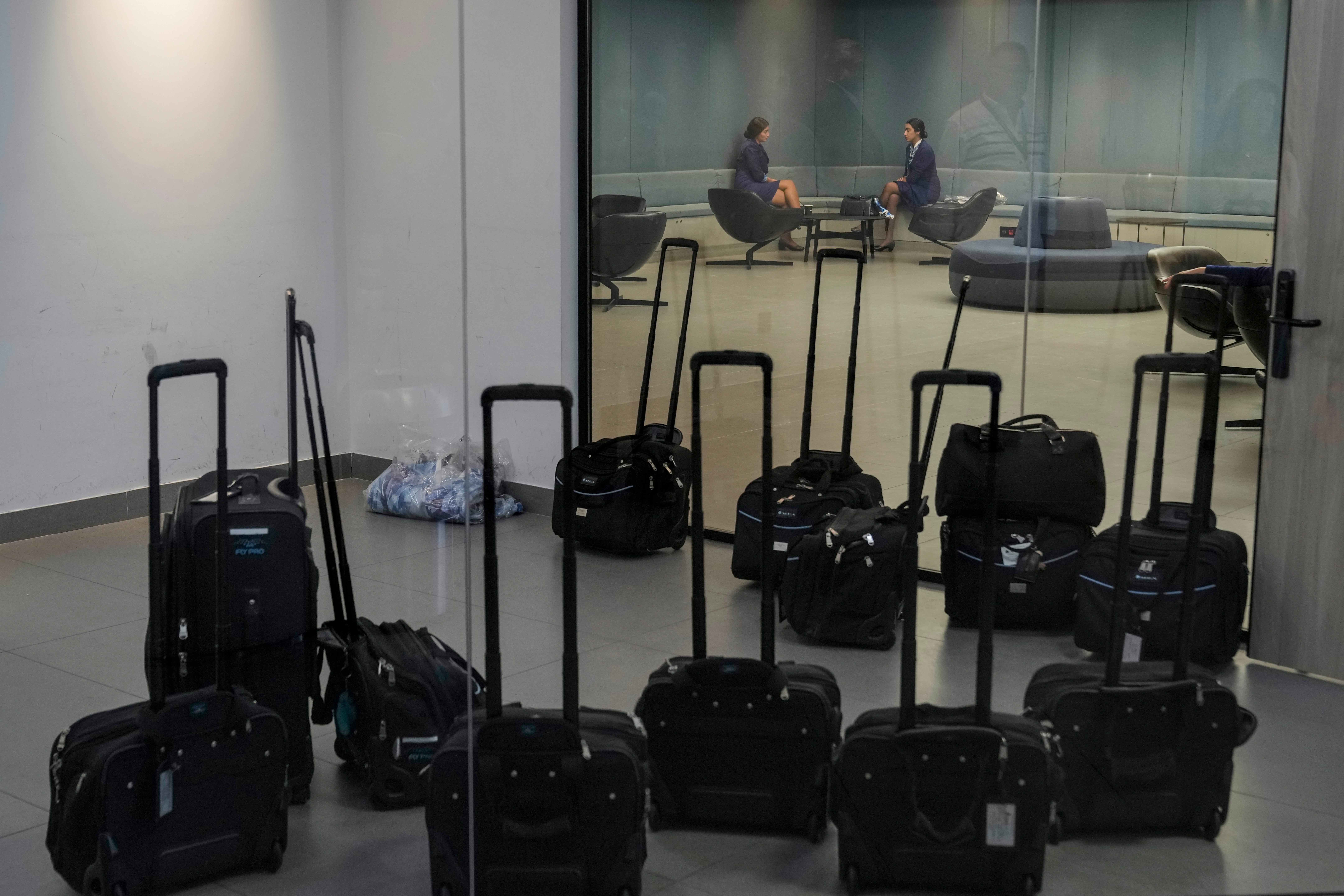The airline dodging missiles to continue flights from Lebanon amid Israel airstrikes
The sight of jetliners rising and descending as fire and clouds of smoke blacken the Beirut skyline can be alarming

Your support helps us to tell the story
From reproductive rights to climate change to Big Tech, The Independent is on the ground when the story is developing. Whether it's investigating the financials of Elon Musk's pro-Trump PAC or producing our latest documentary, 'The A Word', which shines a light on the American women fighting for reproductive rights, we know how important it is to parse out the facts from the messaging.
At such a critical moment in US history, we need reporters on the ground. Your donation allows us to keep sending journalists to speak to both sides of the story.
The Independent is trusted by Americans across the entire political spectrum. And unlike many other quality news outlets, we choose not to lock Americans out of our reporting and analysis with paywalls. We believe quality journalism should be available to everyone, paid for by those who can afford it.
Your support makes all the difference.Since Israel began bombarding Beirut's southern suburbs as part of its offensive against the Hezbollah militant group, Lebanon's national air carrier has become a local icon.
Middle East Airlines is the only commercial airline still operating out of the Beirut airport, located on the coast next to the densely-populated suburbs where many of Hezbollah's operations are based.
Unlike the bruising monthlong war between Israel and Hezbollah in 2006, in which an Israeli strike almost immediately took Lebanon's only commercial airport out of commission, it has not been targeted in the current conflict.
Capt. Mohammed Aziz, adviser to MEA chairman Mohamad El-Hout, said the airline has received assurances that Israel won't target its planes or the airport as long as they are used solely for civilian purposes. The carrier conducts a risk assessment each day to determine if it's safe to fly, he said.
“As long as you see us operating, it means our threat assessment says that we can operate," Aziz said. “We will never jeopardize the life of anyone.”

Still, the sight of jetliners rising and descending as fire and clouds of smoke blacken the Beirut skyline can be alarming.
Some of the most dramatic images making the rounds on social media depicting jets landing in fiery hellscapes have been AI-generated. And, Aziz said, the plumes of smoke that appear in news footage are often farther away from the airport than they appear.
Still, some strikes have landed too close for comfort. On Monday night, one hit the coastal area of Ouzai, about 200 meters (650 feet) from one of the runways. There were no planes in the area at the time.
Since the escalation began, many embassies have chartered extra commercial flights to get their citizens out. Other flights have carried Lebanese citizens to nearby destinations like Turkey and Cyprus to wait out the conflict.
The number of daily MEA flights ranges from 32 to 40 — not much below the usual number for this time of year, Aziz said. The difference: now the flights usually depart Beirut full and return two-thirds or three-quarters empty.

While many Lebanese have fled, others continue to fly in and out for business or family reasons.
Elie Obeid, a business consultant, was scheduled to fly to Brussels this month for a seminar. After his original flight on Turkish Airlines was canceled, he booked on MEA.
As his return flight was landing Saturday, heavy airstrikes were underway in the surrounding area. Onboard, Obeid was unaware of what was happening until the plane landed and he opened his phone to a barrage of messages.
He said he had mixed feelings about the experience.
“I do appreciate the fact that they are still flying, since that’s our only connection with the outer world currently,” he said. “But at the same time it is very risky. We should have been told that strikes were happening, and maybe even they could have told the pilot to request to land in Cyprus for a while until the strikes ended.”
John Cox, a U.S.-based former airline pilot who is now an aviation-safety consultant, said when there's a potential threat, it's the captain’s call whether or not to proceed, and it’s not unusual for passengers to be left in the dark.
Telling them about a threat they can’t control “doesn’t really do any good, and it stresses them out. So, I would be very hesitant to do that,” he said.
But, he added, "I’m not sure that I want to fly into an area of open conflict like that with passengers on board.”

It is “pretty unusual,” Cox said, for a commercial airline to decide that operating in an active war zone is an “acceptable level of risk.”
“When you’re in an area with ongoing military operations there’s an awful lot of variables,” he said. “Even just keeping the airplanes ... so that they’re not in the same airspace at the same time, that becomes very difficult.”
Aziz said the airline is in “continuous coordination” with the Lebanese government and security agencies, and attempts to mitigate the risk by spacing out flights so the airport is not too crowded at any given time. About 20% of its fleet is parked outside of Lebanon to reduce potential damage.
They have also taken measures to adjust for the frequent GPS jamming that is used by Israel to ward off missile and drone attacks but also disrupts civilian navigation technology.
Other airlines have different considerations, Aziz said. Their trips to Lebanon might be “one flight out of 200 or 300 flights per day, so spending two or three hours a day just to make a risk assessment for one flight is a waste of time for them,” he said.
“But for us it’s a necessity, because if we don’t do it we’ll stop operation completely.”
He added, “It’s our duty, of course, to maintain this link between Lebanon and the outside world.”
For many, having that link is a comfort — even if the journey might be harrowing.
Marie-Jose Daoud, editor-in-chief of an online journalism platform, flew to Cyprus with her parents a few days after the massive strike in Beirut's southern suburbs that killed Hezbollah leader Hassan Nasrallah.
As they were waiting for their flight, she saw on the news that the Israeli military had issued evacuation notices for two areas close to the airport. Soon after, she heard the muffled sounds of airstrikes through the airport's soundproofed walls.
As the plane took off, the crew and most of the passengers remained calm. One man pointed out the window to show his young son the smoke rising. The plane made it safely to Cyprus.
Daoud said her parents want to return home despite the risks, so she is traveling back with them in a few days. She plans to leave again soon after, but she knows she can “come back at a day's notice” if her family needs her.
“As long as the airport is open, I know that (MEA) are going to be flying,” she said.